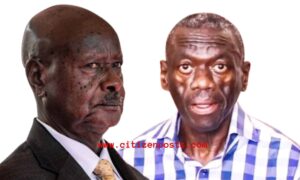At the age of 85, Gen Moses Ali could easily be enjoying a peaceful retirement in Uganda’s Adjumani District. However, he remains actively engaged in politics as the Second Deputy Prime Minister and Deputy Leader of Government Business in Parliament, also serving as the Member of Parliament for Adjumani West.
Gen Moses Ali has been a fixture in Ugandan politics for decades, starting with his role as Minister of Finance during Idi Amin’s controversial regime. He later became involved in opposition efforts against the second administration of Apollo Milton Obote through the Uganda National Rescue Front rebel group. Eventually, he found common ground with Yoweri Museveni’s National Resistance Army (NRA), leading to his transition into mainstream politics.
Despite his advancing age and occasional public appearances that portray frailty, Gen Moses Ali remains resolute in his commitment to electoral politics. With Uganda scheduled to hold its next round of elections in 2026, when he will be 87 years old, he plans to seek reelection as MP for Adjumani West. If successful, he would complete another term by the age of 92 in 2031.
During the 2021 elections, Gen Moses Ali secured victory as the National Resistance Movement candidate, receiving 10,227 votes in Adjumani West constituency. His closest rival, Patrick Tandrupasi of the Forum for Democratic Change, garnered 6,891 votes, reflecting Ali’s enduring popularity despite his age.
Recently, on June 26, Gen Moses Ali returned to his hometown of Adjumani to preside over various community initiatives, including the distribution of 130 land titles, the launch of the Kiraba Community Resource Centre, and the commissioning of the KuluKulu-Zoka Community Road in Ukusijoni Sub County.
Addressing the gathering, Gen Moses Ali addressed speculation about his political future, citing his intent to contest in the upcoming elections. He dismissed concerns about his age and health, emphasizing his right to participate in democratic processes without restriction on age or term limits. Despite previous health challenges, including collapses and battles with illness, he remains determined to represent Adjumani West vigorously.
As he prepares for the 2026 elections, Gen Moses Ali’s determination and resilience continue to shape Uganda’s political landscape, prompting both admiration and debate about the role of elderly leaders in modern governance.
Gen. Moses Ali is a prominent Ugandan politician and military leader who has played significant roles in both the military and political spheres of Uganda over several decades. Born on February 10, 1939, in Uganda’s West Nile region, Moses Ali’s life and career have been intertwined with the country’s turbulent history, spanning from colonial times to post-independence challenges and beyond.
Moses Ali received his early education in Uganda, attending local schools in the West Nile region. His upbringing during this period was influenced by the political and social changes that were shaping Uganda as it moved towards independence from British colonial rule. This environment likely played a crucial role in shaping his future ambitions and perspectives on governance and leadership.
His military career began in the early 1960s when he joined the Ugandan Army, then known as the Uganda Army (UA), under the leadership of Prime Minister Milton Obote. During this period, Uganda was grappling with internal tensions and political instability, exacerbated by regional and ethnic divisions. Ali’s military training and early assignments would have exposed him to the complexities of maintaining security and order in a newly independent nation.
In 1971, General Idi Amin seized power in a military coup, overthrowing Milton Obote’s government. This event marked a significant turning point in Uganda’s history and also affected Moses Ali’s career trajectory. Amin’s regime was characterized by authoritarianism, human rights abuses, and political repression. Within this context, Moses Ali rose through the ranks of the military, assuming various command roles that aligned with Amin’s regime’s objectives.
Ali’s prominence within Amin’s inner circle grew, and he became a key figure in the regime’s military and political machinery. His loyalty and effectiveness in executing Amin’s directives earned him trust and influence, solidifying his position as a central figure in Uganda’s military hierarchy during one of its most tumultuous periods.
The downfall of Idi Amin in 1979 marked another pivotal moment in Moses Ali’s career. Amin’s regime collapsed following a combined military effort involving Tanzanian forces and Ugandan exiles. This event led to a period of political transition and uncertainty in Uganda, during which different factions vied for power and influence.
In the subsequent years, Moses Ali navigated Uganda’s shifting political landscape, eventually aligning himself with the National Resistance Movement (NRM) led by Yoweri Museveni. The NRM emerged victorious in the Ugandan Bush War, which lasted from 1981 to 1986 and culminated in Museveni assuming the presidency.
Under Museveni’s administration, Moses Ali transitioned from a military career to a prominent political figure. He held various ministerial positions within the Ugandan government, including Deputy Prime Minister and Minister of Internal Affairs. These roles underscored his enduring influence and contribution to Uganda’s governance and policymaking processes.
Throughout his career, Moses Ali has been recognized for his leadership, resilience, and adaptability in navigating Uganda’s complex political terrain. His journey from a military officer during Idi Amin’s regime to a senior statesman in Uganda’s democratic era reflects broader themes of continuity and change within African politics.
In conclusion, Moses Ali’s biography encapsulates not only his personal journey but also the broader historical and political developments that have shaped Uganda’s trajectory since independence. His contributions, both in military service and political leadership, highlight the intersections of power, ideology, and governance in post-colonial Africa. As Uganda continues to evolve, Moses Ali remains a significant figure whose experiences offer insights into the country’s past, present, and future aspirations.


















